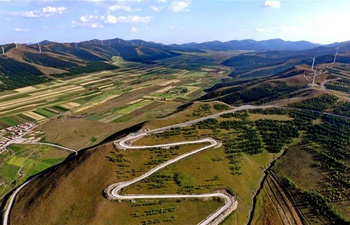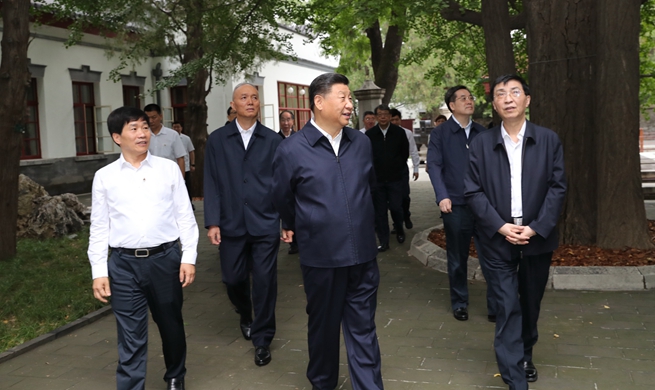by Burak Akinci
ANKARA, Sept. 14 (Xinhua) -- Frustrated by the U.S. delay to create a safe zone in Syria, Turkish President Recep Tayyip Erdogan's recent threats to flood Europe with refugees may not be just bluff this time, experts said.
"President Erdogan threatened before to let Syrian refugees go in mass to Europe, complaining of a lack of financial support, but this time, it might be a real deal which could happen," Mehmet Enes Beser, director of the Ankara-based Bosphorus Center for Asian Studies, told Xinhua.
"This time, Turkey is under pressure from both the U.S. and Russia in Syria, after the Syrian regime forces' progress in the northern Idlib province, and Erdogan is entangled in a difficult balance, so he could be serious about the refugees," the expert said.
Last week, Erdogan threatened to "open the gates" to allow Syrian refugees to leave Turkey for the EU countries, if a safe zone inside Syria, insistently requested by Ankara, is not established soon.
Erdogan's comments came amid Ankara's growing tension with Washington over the latter's delay in establishing the safe zone, mainly due to the differences on dealing with a key U.S.-allied Kurdish militia, the People's Protection Units (YPG), which Ankara regards as a terrorist organization.
Ankara has been threatening to allow the unilateral entry of its troops into the safe zone if no progress is made, which would constitute the third incursion into northern Syria since 2016.
With Turkey hosting some 3.6 million Syrian refugees, Erdogan's threat raised the possibility of a surge in the flow of refugees into Europe that could cause major problems inside the European bloc.
"We will be forced to open the gates. We cannot be forced to handle the burden alone," Erdogan said earlier this month, asking for adequate international support to enable his country to cope with the Syrian refugee issue.
The Turkish president has become increasingly angry with the U.S. and EU over the refugee issue, claiming that Turkey has spent 40 billion U.S. dollars to support the refugees while criticizing Western countries for failing to live up to their promises.
Under a 2016 agreement following a massive surge of migrant arrivals in its member countries, the EU promised Ankara 6 billion euros (6.63 billion U.S. dollars) in exchange for stronger controls on the Turkish borders.
However, Erdogan said that only 3 billion euros (3.31 billion U.S. dollars) had so far been paid to Turkey which is recovering from a painful economic downturn.
On the other hand, following an agreement with the U.S. in early August to set up the controversial safe zone in northern Syria, Turkey has been frustrated by what it sees as Washington's foot-dragging.
The safe zone was originally proposed last year by U.S. President Donald Trump, and the two sides finally reached a deal on Aug. 7 following talks in Ankara.
Erdogan has said that the safe zone, also dubbed as a "peace corridor," would relocate up to 1 million Syrian refugees in Turkey, alleviating some of the political pressure that he is facing in Turkey where anti-refugee sentiments are on the rise.
But Ankara and Washington have been at odds over the fate of the YPG, which had been a key part of a U.S.-backed force fighting the militant group Islamic State (IS).
"We are saying that we should form such a safe zone that we, as Turkey, can build towns instead of the tent cities here," Erdogan said on Tuesday in Ankara.
"Give us logistical support and we can build houses at 30-km depth in northern Syria. This way, we can provide them with humane living conditions," he added.
However, Beser expressed doubts about the figures mentioned by Erdogan, arguing that "the region where Turkey wants to establish a safe zone cannot contain such a large number of refugees. There is simply not enough resources on which they would live."
Experts believe that by repeatedly threatening the EU with sending refugees, Erdogan is trying to make the EU deal with the issue more seriously and take concrete actions.
"Turkey is more than saturated and cannot afford another wave of refugees from Idlib," Oytun Orhan, coordinator of Syria studies at the Center for Middle Eastern Strategic Studies, told Xinhua.
"Such a scenario would have devastating effects, and thus, Erdogan is trying to mobilize the European public opinion and break the silence of their governments regarding the refugee crisis," Orhan said.
He added that since the start of the Syrian civil war in 2011, Turkey has not only protected its own security but also Europe's, "without receiving the necessary support that it deserves."
"President Erdogan in fact wants the West to see how costly its potential inaction would be for every party if something is not done fast regarding Syrian refugees," the expert said.

















